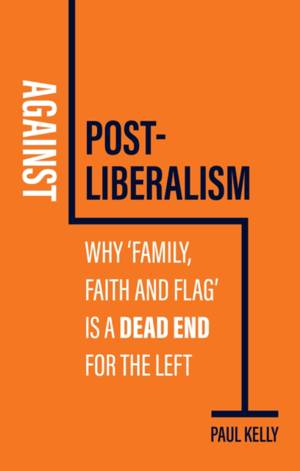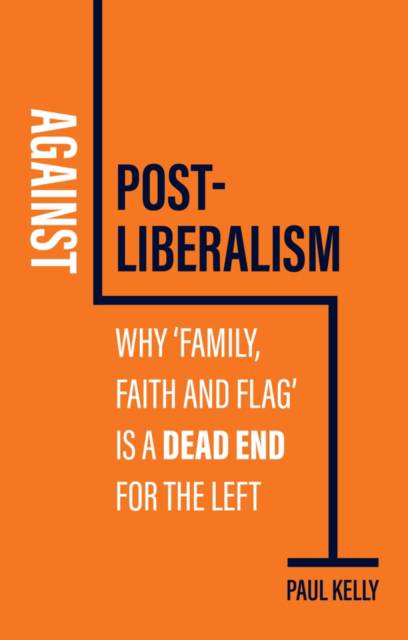
- Afhalen na 1 uur in een winkel met voorraad
- Gratis thuislevering in België vanaf € 30
- Ruim aanbod met 7 miljoen producten
- Afhalen na 1 uur in een winkel met voorraad
- Gratis thuislevering in België vanaf € 30
- Ruim aanbod met 7 miljoen producten
Zoeken
Against Postliberalism
Why 'Family, Faith and Flag' Is a Dead End for the Left
Paul Kelly
Hardcover | Engels
€ 86,45
+ 172 punten
Uitvoering
Omschrijving
Liberal politics is in crisis and it is a crisis of its own making - so say the post-liberals whose new ideology of family, faith and flag is shaping debates about the future of the Left. But are they right? Does post-liberalism offer credible answers to the problems that characterise our increasingly fragmented and unequal world?
In this bold analysis, political theorist Paul Kelly responds with a resounding no. He makes a powerful case against post-liberalism and exposes the flaws and contradictions of the dominant strands of post-liberal thinking. Drawing on the ideas of key post-liberal thinkers including John Gray, Alasdair MacIntyre, Maurice Glasman, Matthew Goodwin, Danny Kruger, J.D. Vance, Patrick Deneen and Adrian Vermuele, he sheds light on some of the darker sources behind the movement, arguing that post-liberalism fails to take seriously the real challenges of late modernity. It is neither feasible in its ambitions to return to a form of capitalism superseded by technological globalisation, and in its Trump/Vance US version it is an unattractive assault on equality, social mobility, university education and changes in social roles and expectations.
Against Post-Liberalism is both a critique of post-liberal ideas and a passionate defence of liberalism. It is a must-read for anyone interested in contemporary challenges to liberalism and humane values.
In this bold analysis, political theorist Paul Kelly responds with a resounding no. He makes a powerful case against post-liberalism and exposes the flaws and contradictions of the dominant strands of post-liberal thinking. Drawing on the ideas of key post-liberal thinkers including John Gray, Alasdair MacIntyre, Maurice Glasman, Matthew Goodwin, Danny Kruger, J.D. Vance, Patrick Deneen and Adrian Vermuele, he sheds light on some of the darker sources behind the movement, arguing that post-liberalism fails to take seriously the real challenges of late modernity. It is neither feasible in its ambitions to return to a form of capitalism superseded by technological globalisation, and in its Trump/Vance US version it is an unattractive assault on equality, social mobility, university education and changes in social roles and expectations.
Against Post-Liberalism is both a critique of post-liberal ideas and a passionate defence of liberalism. It is a must-read for anyone interested in contemporary challenges to liberalism and humane values.
Specificaties
Betrokkenen
- Auteur(s):
- Uitgeverij:
Inhoud
- Aantal bladzijden:
- 191
- Taal:
- Engels
Eigenschappen
- Productcode (EAN):
- 9781509552443
- Verschijningsdatum:
- 7/01/2026
- Uitvoering:
- Hardcover
- Formaat:
- Genaaid

Alleen bij Standaard Boekhandel
+ 172 punten op je klantenkaart van Standaard Boekhandel
Beoordelingen
We publiceren alleen reviews die voldoen aan de voorwaarden voor reviews. Bekijk onze voorwaarden voor reviews.











